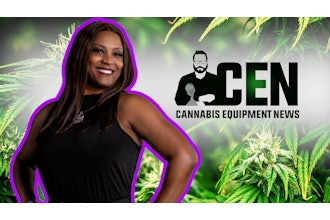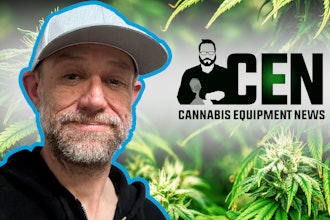Editor's Note: Download the audio version below and click here to subscribe to our newsletter.
When Nick Zimmer was in college, he started dabbling in hydroponics. He grew a few plants, and the experience changed his career trajectory and life.
He changed his major to horticulture and went on to become a conventional grower in the ornamentals business. Part of his job included putting on a Tyvek suit and gas mask and spraying down the entire growing space with pesticides, chemicals he says would likely lead to his eventual death. Then, Zimmer heard about beneficials (good bugs), proposed using them to his employer and started phasing out pesticides.
He now owns a commercial ornamentals business, Willow Greenhouse, that uses beneficials for pesticide-free cultivation. He also founded Plantsman to provide cannabis growers with bug support for cannabis crops.
Zimmer's goal is to eliminate all pesticides from every grow facility, replacing pesticides with beneficial insects. He says he is swapping chemistry for biology, and it's a pretty tried and true method since it's already worked in nature since the beginning of time.
According to Zimmer, current agriculture has led us down a path of monoculture -- we grow everything the same and spray it with something harsh enough to kill everything off. Zimmer says it's time to think of agriculture as an ecosystem and use nature to balance things.
In current cannabis, organic is trending. Growers don't have many options for approved pesticides, and bugs can be a great tool. Organic pest prevention includes inoculating plants with good bugs when they are young in veg. The plants are dosed every two-to-three weeks to stay ahead of the pests.
Zimmer typically uses five main species of bugs. These are predatory mites that are nearly microscopic and live in the soil or on the plant and target pests. He also uses beetles and microscopic nematodes, among others.
Good bugs often get a bad rap, and cannabis growers have many misconceptions about how and when to use them. For example, many growers only think of beneficials as a cure to a pest problem. However, the bugs are best when used before a situation arises. To many, it may seem odd to introduce bugs beforehand, but that's how growers can best build a cost-effective ecosystem that targets thrips, spider mites and others.
Admittedly, Zimmer adds that sometimes growers just have to hit a pest problem with a spray. After all, cannabis basically has a zero threshold for pests. But in the long run, beneficials provide a solution that is simpler, cleaner and better for employees at the grow.
At Plantsman, heavy customer support is a differentiator. Zimmer says basic assistance is lacking in the industry, so he likes to arm cannabis pros with a plan of action.
He works with cultivators of all sizes, from a 12-plant basement grow to a recent partnership with one of California's largest cultivators with 3,500 lights across ten facilities.
Zimmer sources the bugs from a large insectary on the east coast, and he does his own quality control. After all, he's an admitted bug nerd who often likes to get his bugs under a microscope and see how they are doing.
Cultivators are understandably leery about inviting bugs into their grow, but with a two-to-four-week life cycle, the beneficials are dead and gone long before harvest. Zimmer adds that he has never had a negative test result or visible bug show up in a test. It all comes down to timing, growers need to make sure they stop releasing mid-flower, and Zimmer's game plan helps make it happen. Although, he does stress that there is no one-size-fits-all solution.
In this episode of the Cannabis Equipment News podcast, Zimmer also covers the good bug releasing process and cleanup, how to determine which beneficials to use and how federal regulation will impact the bug business.
Please make sure to like, subscribe and share the podcast. You could also help us out by giving the podcast a positive review. Finally, to email the podcast or suggest a potential guest, you can reach David Mantey at David @cannabisequipmentnews.com.






















